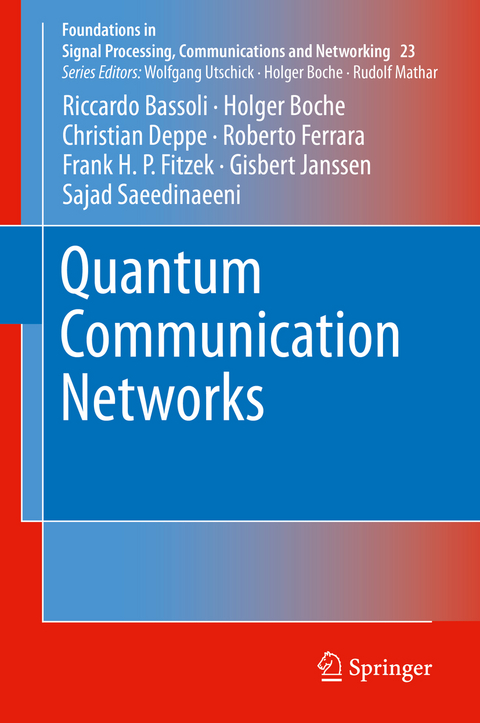
Quantum Communication Networks
Springer International Publishing (Verlag)
978-3-030-62937-3 (ISBN)
This book provides a tutorial on quantum communication networks. The authors discuss current paradigm shifts in communication networks that are needed to add computing and storage to the simple transport ideas of prevailing networks. They show how these 'softwarized' solutions break new grounds to reduce latency and increase resilience. The authors discuss how even though these solutions have inherent problems due to introduced computing latency and energy consumption, the problems can be solved by hybrid classical-quantum communication networks. The book brings together quantum networking, quantum information theory, quantum computing, and quantum simulation.
lt;p>Riccardo Bassoli is senior researcher at Deutsche Telekom Chair of Communication Networks at Faculty of Electrical and Computer Engineering at Technische Universität Dresden (Germany). He received his B.Sc. and M.Sc. degrees in Telecommunications Engineering from University of Modena and Reggio Emilia (Italy) in 2008 and 2010 respectively. Next, he received his Ph.D. degree from 5G Innovation Centre at University of Surrey (UK), in 2016. He was also a Marie Curie ESR at Instituto de Telecomunicações (Portugal) and visiting researcher at Airbus Defence and Space (France). Between 2016 and 2019, he was postdoctoral researcher at University of Trento (Italy). He is IEEE and ComSoc member. He is also member of Glue Technologies for Space Systems Technical Panel of IEEE AESS.
Holger Boche received the Dr.rer.nat. degree in pure mathematics from the Technische Universität Berlin, Berlin, Germany, in 1998, the Dipl.Ing. and Dr.Ing. degrees in electrical engineering from the Technische Universität Dresden, Dresden, Germany in 1990 and 1994, respectively, and the degree in mathematics from the Technische Universität Dresden, in 1992. From 1994 to 1997, he was involved in postgraduate studies in mathematics with the Friedrich-Schiller Universität Jena, Jena, Germany. In 1997, he joined the Heinrich-Hertz-Institut (HHI) für Nachrichtentechnik Berlin, Berlin. In 2002, he was a Full Professor of mobile communication networks with the Institute for Communications Systems, Technische Universität Berlin. In 2003, he became the Director of the Fraunhofer German-Sino Laboratory for Mobile Communications,Berlin, and the Director of HHI in 2004. He was a Visiting Professor with ETH Zurich, Zürich, Switzerland, in Winter 2004 and 2006, and KTH Stockholm, Stockholm, Sweden, in Summer 2005. Since 2010, he has been with the Institute of Theoretical Information Technology and a Full Professor with the Technische Universität München, Munich, Germany. He was elected as a member of the German Academy of Sciences Leopoldina in 2008 and the Berlin Brandenburg Academy of Sciences and Humanities in 2009. Since 2014, he has been a member and an Honorary Fellow of the TUM Institute for Advanced Study, Munich. He is a member of the IEEE Signal Processing Society SPCOM and the SPTM Technical Committee. He was a recipient of the Research Award Technische Kommunikation from the Alcatel SEL Foundation in 2003, the Innovation Award from the Vodafone Foundation in 2006, and the Gottfried Wilhelm Leibniz Prize from the German Research Foundation in 2008, and the 2007 IEEE Signal Processing Society Best Paper Award, and a corecipient of the 2006 IEEE Signal Processing Society Best Paper Award.
Christian Deppe received the Dipl.-Math. degree in mathematics from the Universität Bielefeld, Bielefeld, Germany, in 1996, and the Dr.-Math. degree in mathematics from the Universität Bielefeld, Bielefeld, Germany, in 1998. He was a Research and Teaching Assistant with the Fakultät für Mathematik, Universität Bielefeld, from 1998 to 2010. From 2011 to 2013 he was project leader of the project ``Sicherheit und Robustheit des Quanten-Repeaters´´ of the Federal Ministry of Education and Research at Fakultät für Mathematik, Universität Bielefeld. In 2014 he was supported by a DFG project at the Institute of Theoretical Information Technology, Technische Universität München. In 2015 he had a temporary professorship at the Fakultät für Mathematik und Informatik, Friedrich-Schiller Universität Jena. He is currently project leader of the project ``Abhörsichere Kommunikation über Quanten-Repeater´´ of the Federal Ministry of Education and Research at Fakultät für Mathematik, Universität Bielefeld. Since 2018 he is at the Department of Communications Engineering at the Technical University of Munich.
Roberto Ferrara have obtained his Msc in physics at the Niels Bohr Institute of the University of Copenhagen and his PhD
Introduction.- Fundamental Background.- Quantum Computing and Programming.- Quantum Information Theory.- Quantum Error Correction.- Quantum Communication Networks- Quantum Communication Networks: Design and Simulation.- Quantum Communication Networks: Final Considerations and Use Cases.
| Erscheinungsdatum | 05.02.2021 |
|---|---|
| Reihe/Serie | Foundations in Signal Processing, Communications and Networking |
| Zusatzinfo | XVI, 229 p. 64 illus., 13 illus. in color. |
| Verlagsort | Cham |
| Sprache | englisch |
| Maße | 155 x 235 mm |
| Gewicht | 523 g |
| Themenwelt | Technik ► Elektrotechnik / Energietechnik |
| Technik ► Nachrichtentechnik | |
| Schlagworte | quantum coding • Quantum communication networks • Quantum Computing • Quantum Information Theory • quantum programming • quantum simulation |
| ISBN-10 | 3-030-62937-6 / 3030629376 |
| ISBN-13 | 978-3-030-62937-3 / 9783030629373 |
| Zustand | Neuware |
| Haben Sie eine Frage zum Produkt? |
aus dem Bereich


